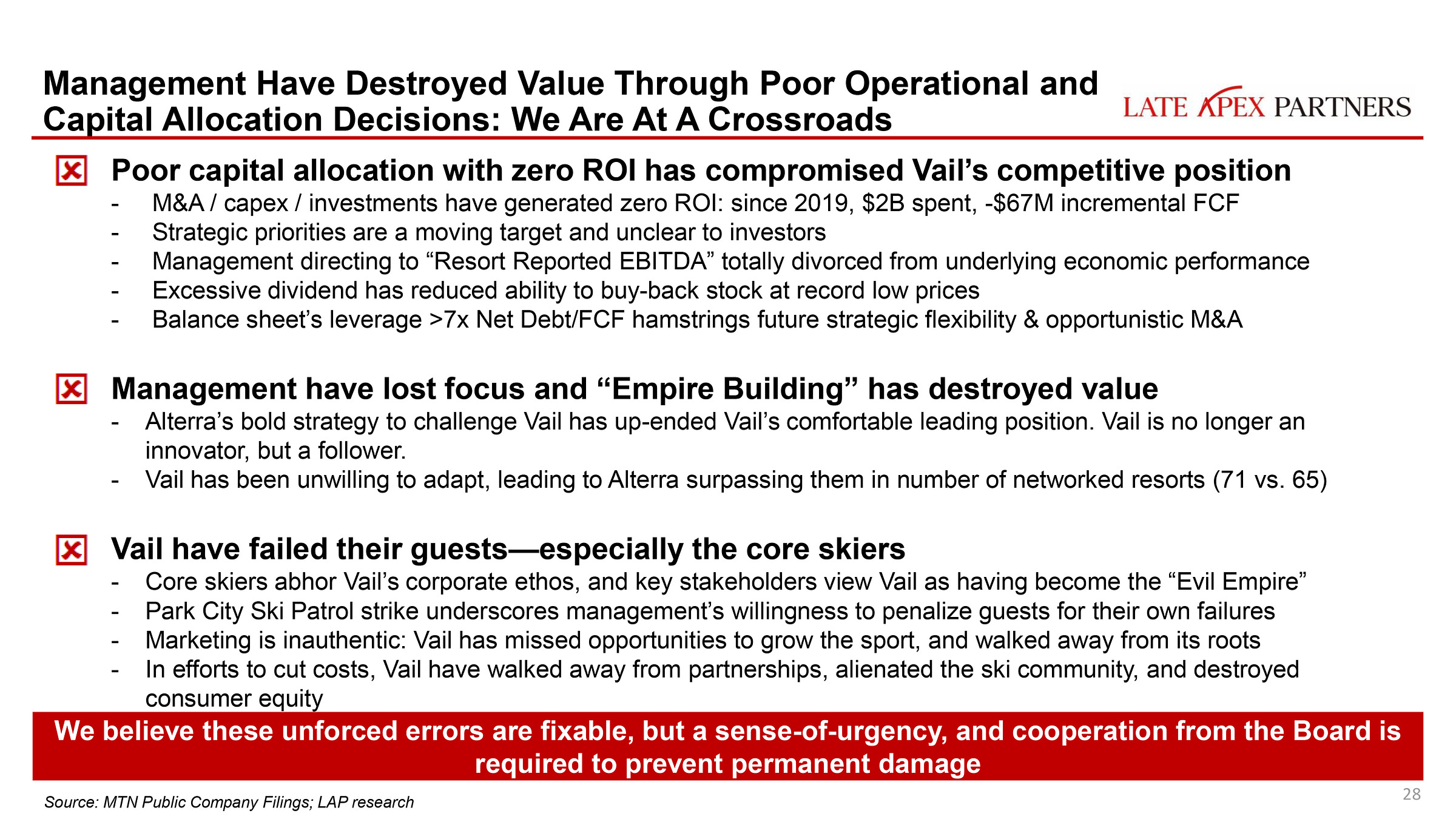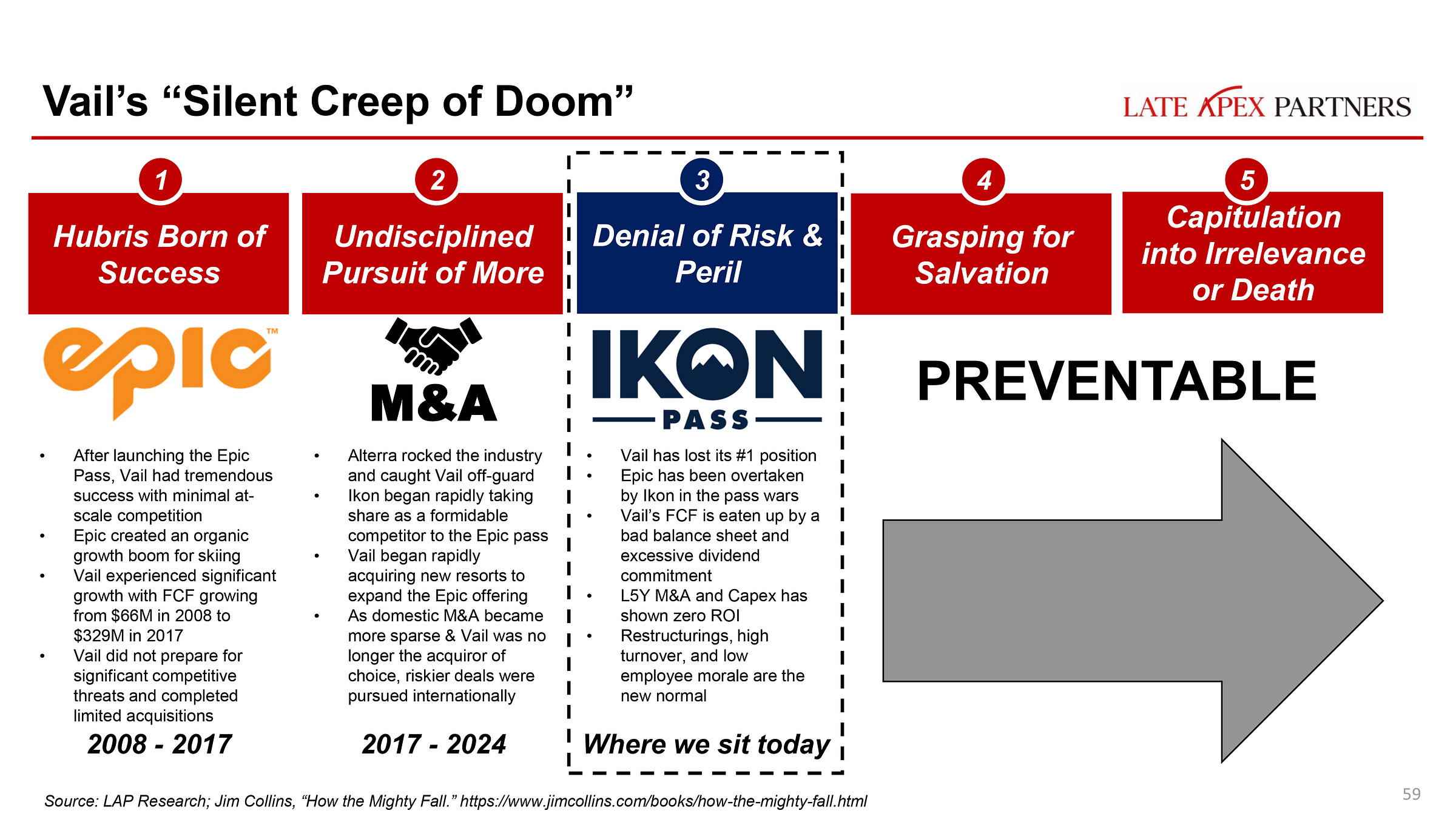Late Apex Partners May Have Driven Vail Resorts' CEO Change – Who Are They & What Do They Want?
Did a self-described basement stock trader just force change at the world’s largest ski resort operator?
In January, an important-sounding outfit by the name of Late Apex Partners dropped a scalding 88-page dismantling of Vail Resorts’ leadership. The deck presented like the final product of a 10-person activist investor squad assembled at a blue-chip financial firm: dense, detailed, ordered, exhaustive, and aggressive in its certitude that Vail had missed a turn on the access road, plunged off a switchback, and was headed for a fiery crash unless someone sent in a rescue chopper soon.
So who was this pitbull straining at the leash for a fat chunk of VR’s Nikes? No one in the investment community, according to institutional investors I spoke with, had ever heard of them. Nor, according to Vail Daily, had Vail Resorts. SAM labeled Late Apex an “investment firm.” Park Record also used the word “firm.” Even The Wall Street Journal picked up the story.
Turns out Late Apex “is just my personal money,” said Taylor Schmidt, a self-described “guy in my basement who likes to pick stocks and is passionate about finding great businesses.”
Schmidt characterizes Late Apex itself as a Delaware-registered “personal investment vehicle” with no outside capital. He founded the entity because “it's easier when you have a more legit email address than your Gmail when you're reaching out to companies and asking them questions,” he said.
By day, Schmidt works in private equity, at Cadence Petroleum Group, which he describes as “a portfolio company in the oil and gas industry” (they source oil for oil-change emporiums). Schmidt’s boss is, he said, “very supportive of my stock-picking hobby.”
But that hobby appears to be rapidly evolving into something larger. Schmidt’s phone was “a bomb just exploding” for 48 hours after he released his deck. “I've been surprised, but overall just grateful for the relationships and hopefully can make Vail a better business for its employees, its customers, its shareholders. I think at the end of the day, that’s the driving force.”
Among the hundreds of messages he received since January have been job offers and inquiries in how to invest in Late Apex.
Schmidt declined to disclose the size of his Vail Resorts stock holding, but described it as “not enough to make me a very rich man.”
Regardless of the size of Schmidt’s holdings, the deck, an at-once frantic and sober document laced with and fueled by Finance Bro hand grenades about “value destruction,” “underperformance,” and “collapse,” captured widespread investor and media attention, commandeered Vail Resorts’ corporate narrative for months, and, incidentally or not, preceded the rapid end of Kirsten Lynch’s 1,303-day run as company CEO.
Schmidt hesitates to take any credit for Vail’s leadership transition.
“Maybe I like in some way created a spark,” he told The Storm recently. “But I think if you're a fiduciary of a business as a board member, I think this is going to happen no matter what. Hopefully I created a little bit of extra pressure to move things along.”
Regardless of intent, Schmidt and Late Apex have introduced themselves to the investment community and inserted themselves into the story of Vail Resorts. We spoke for more than an hour last Thursday, May 29 about where Schmidt thinks Vail went wrong and how the company can return to Epic Pass growth and rescue the flagging stock. Here are highlights from our conversation, edited for length and clarity:
STUART WINCHESTER: How are you feeling about the leadership change at Vail? Do you think Rob Katz was the right choice?
TAYLOR SCHMIDT: I have mixed feelings. Vail’s at a very clear tipping point, both for the business and their external relations. On one hand, you could say, hey, Rob understands the business. He really gets it. He knows what levers to pull that drive value. He knows the people, knows the towns and the environments and could, in theory, help build bridges. He was thought of very favorably by a lot of the employees and people in the industry for a long time.
On the other hand, it's not like Rob has ever been out. He's been the executive chairman and in theory has been dedicated full time to the business this whole time. And a lot of the strategy that's been carried out and executed by Kirsten has been under his watch. There are very real risks regarding relationships with towns and local city governments across the destination resorts - is he going to be able to bridge the gaps there?
So it's a question mark of whether or not Rob’s willing to reinvent himself and disrupt himself to take Vail to the next stage.




